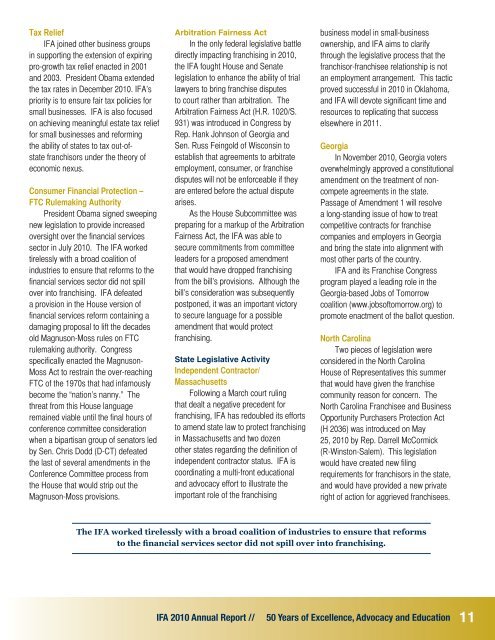2 0 1 0 A n n u A l R e p o R t - International Franchise Association
2 0 1 0 A n n u A l R e p o R t - International Franchise Association
2 0 1 0 A n n u A l R e p o R t - International Franchise Association
You also want an ePaper? Increase the reach of your titles
YUMPU automatically turns print PDFs into web optimized ePapers that Google loves.
Tax Relief<br />
IFA joined other business groups<br />
in supporting the extension of expiring<br />
pro-growth tax relief enacted in 2001<br />
and 2003. President Obama extended<br />
the tax rates in December 2010. IFA’s<br />
priority is to ensure fair tax policies for<br />
small businesses. IFA is also focused<br />
on achieving meaningful estate tax relief<br />
for small businesses and reforming<br />
the ability of states to tax out-ofstate<br />
franchisors under the theory of<br />
economic nexus.<br />
Consumer Financial Protection –<br />
FTC Rulemaking Authority<br />
President Obama signed sweeping<br />
new legislation to provide increased<br />
oversight over the financial services<br />
sector in July 2010. The IFA worked<br />
tirelessly with a broad coalition of<br />
industries to ensure that reforms to the<br />
financial services sector did not spill<br />
over into franchising. IFA defeated<br />
a provision in the House version of<br />
financial services reform containing a<br />
damaging proposal to lift the decades<br />
old Magnuson-Moss rules on FTC<br />
rulemaking authority. Congress<br />
specifically enacted the Magnuson-<br />
Moss Act to restrain the over-reaching<br />
FTC of the 1970s that had infamously<br />
become the “nation’s nanny.” The<br />
threat from this House language<br />
remained viable until the final hours of<br />
conference committee consideration<br />
when a bipartisan group of senators led<br />
by Sen. Chris Dodd (D-CT) defeated<br />
the last of several amendments in the<br />
Conference Committee process from<br />
the House that would strip out the<br />
Magnuson-Moss provisions.<br />
arbitration fairness act<br />
In the only federal legislative battle<br />
directly impacting franchising in 2010,<br />
the IFA fought House and Senate<br />
legislation to enhance the ability of trial<br />
lawyers to bring franchise disputes<br />
to court rather than arbitration. The<br />
Arbitration Fairness Act (H.R. 1020/S.<br />
931) was introduced in Congress by<br />
Rep. Hank Johnson of Georgia and<br />
Sen. Russ Feingold of Wisconsin to<br />
establish that agreements to arbitrate<br />
employment, consumer, or franchise<br />
disputes will not be enforceable if they<br />
are entered before the actual dispute<br />
arises.<br />
As the House Subcommittee was<br />
preparing for a markup of the Arbitration<br />
Fairness Act, the IFA was able to<br />
secure commitments from committee<br />
leaders for a proposed amendment<br />
that would have dropped franchising<br />
from the bill’s provisions. Although the<br />
bill’s consideration was subsequently<br />
postponed, it was an important victory<br />
to secure language for a possible<br />
amendment that would protect<br />
franchising.<br />
state legislative activity<br />
Independent Contractor/<br />
Massachusetts<br />
Following a March court ruling<br />
that dealt a negative precedent for<br />
franchising, IFA has redoubled its efforts<br />
to amend state law to protect franchising<br />
in Massachusetts and two dozen<br />
other states regarding the definition of<br />
independent contractor status. IFA is<br />
coordinating a multi-front educational<br />
and advocacy effort to illustrate the<br />
important role of the franchising<br />
Page 11<br />
business model in small-business<br />
ownership, and IFA aims to clarify<br />
through the legislative process that the<br />
franchisor-franchisee relationship is not<br />
an employment arrangement. This tactic<br />
proved successful in 2010 in Oklahoma,<br />
and IFA will devote significant time and<br />
resources to replicating that success<br />
elsewhere in 2011.<br />
Georgia<br />
In November 2010, Georgia voters<br />
overwhelmingly approved a constitutional<br />
amendment on the treatment of noncompete<br />
agreements in the state.<br />
Passage of Amendment 1 will resolve<br />
a long-standing issue of how to treat<br />
competitive contracts for franchise<br />
companies and employers in Georgia<br />
and bring the state into alignment with<br />
most other parts of the country.<br />
IFA and its <strong>Franchise</strong> Congress<br />
program played a leading role in the<br />
Georgia-based Jobs of Tomorrow<br />
coalition (www.jobsoftomorrow.org) to<br />
promote enactment of the ballot question.<br />
North Carolina<br />
Two pieces of legislation were<br />
considered in the North Carolina<br />
House of Representatives this summer<br />
that would have given the franchise<br />
community reason for concern. The<br />
North Carolina <strong>Franchise</strong>e and Business<br />
Opportunity Purchasers Protection Act<br />
(H 2036) was introduced on May<br />
25, 2010 by Rep. Darrell McCormick<br />
(R-Winston-Salem). This legislation<br />
would have created new filing<br />
requirements for franchisors in the state,<br />
and would have provided a new private<br />
right of action for aggrieved franchisees.<br />
The IFA worked tirelessly with a broad coalition of industries to ensure that reforms<br />
to the financial services sector did not spill over into franchising.<br />
IFA 2010 Annual Report // 50 Years of Excellence, Advocacy and Education<br />
11

















